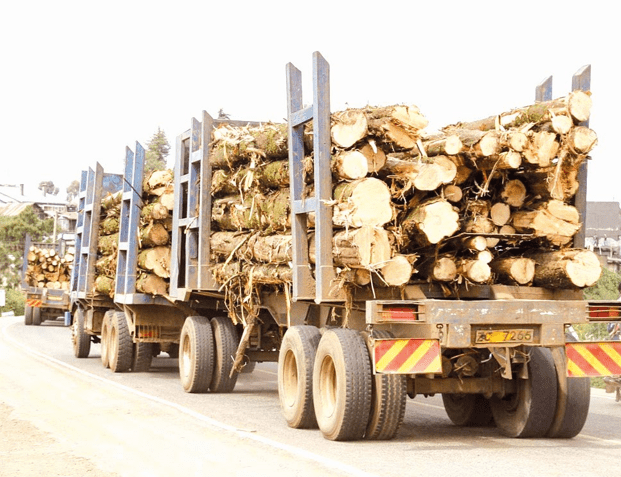Fears of timber price hike as transport fee soars 1,000%

Kenya Forest Service (KFS) has announced a staggering 1,178 per cent increase in timber movement permit fees, effective July 13, 2024.
The hike, from Sh2,000 to Sh25,570, will significantly impact the construction and furniture industries, as timber is a crucial raw material. “This is to notify you that effective 13th July 2024, forest produce import movement permit fees will be charged as follows,” the notice from a KFS official Kepha Ombati’s statement read in part. It was also copied to I/C Malaba OSPB (One-Stop Border Post).
The bulk of the timber movement fee comprises a consignment fee of Sh20,000. A consignment fee is a charge associated with handling, storing, or transporting goods on behalf of another party.
In addition, there will be a Charcoal Movement permit fee of Sh30, and non-wood forest products of Sh2 per kilogramme. All products include a Sh50 E-citizen transaction fee. “All payments will be made only through the E-citizen platform with the TIMS machine we have in the office,” Ombati said.
Furniture manufacturers
As timber costs rise, these expenses will inevitably be passed on to consumers in several ways. Furniture manufacturers and construction companies will raise prices to cover the elevated costs of timber, directly affecting consumers purchasing wooden furniture or homes.
Additionally, the overall cost of building homes will increase, leading to higher housing prices and making homeownership less affordable. Consumers may also postpone buying furniture or homes due to these increased costs, dampening demand in the market.
Furthermore, retailers may not immediately adjust prices downward even if timber costs stabilize, as they often hold inventory purchased at higher prices, prolonging the impact on consumers.
Ultimately, these changes will create a ripple effect, influencing consumer behavior and affordability in the housing and furniture markets. The increased timber costs will also have significant repercussions on the overall economy, as higher timber prices will elevate construction costs, leading to increased housing prices, which could reduce affordability for many consumers and potentially slow down the housing market.
The construction and furniture industries are vital for job creation, and rising costs may lead to reduced hiring or layoffs, impacting household incomes and consumer spending, which are crucial for economic growth. The timber sector has a multiplier effect on the economy; increased costs can lead to decreased spending in other sectors, as construction firms and furniture manufacturers may cut back on purchases from suppliers, affecting jobs and income in those industries.
According to the Economic Survey reports, the construction sector typically contributes around 6-7 per cent to Kenya’s Gross Domestic Product (GDP), with timber being a significant component due to its essential role in building and infrastructure development.
Environmentalists will want to reckon that while the immediate impact of the fee increase may strain the construction sector, it could also serve as a strategic move to reduce environmental degradation. By raising costs, the KFS may encourage more sustainable practices within the industry. Higher fees could lead to reduced timber consumption, prompting builders and manufacturers to use timber more efficiently or seek alternative materials.
This shift could decrease overall demand for timber and mitigate deforestation. The financial burden may also incentivize companies to adopt greener construction methods, such as recycling materials and utilizing eco-friendly technologies, ultimately leading to less waste and pollution.
Forestry practices
As businesses adjust to higher costs, there may also be a shift towards investing in sustainable forestry practices, ensuring that timber sourcing is environmentally responsible. In this way, the fee increase could catalyse a transition towards more environmentally sustainable practices in the long run, balancing economic needs with ecological considerations.











